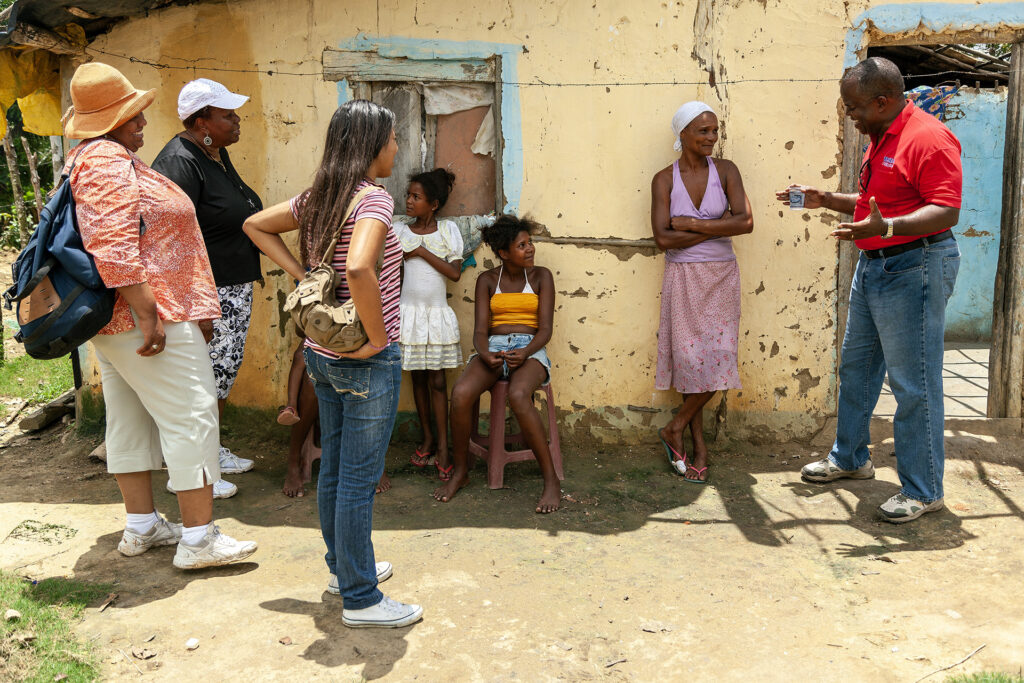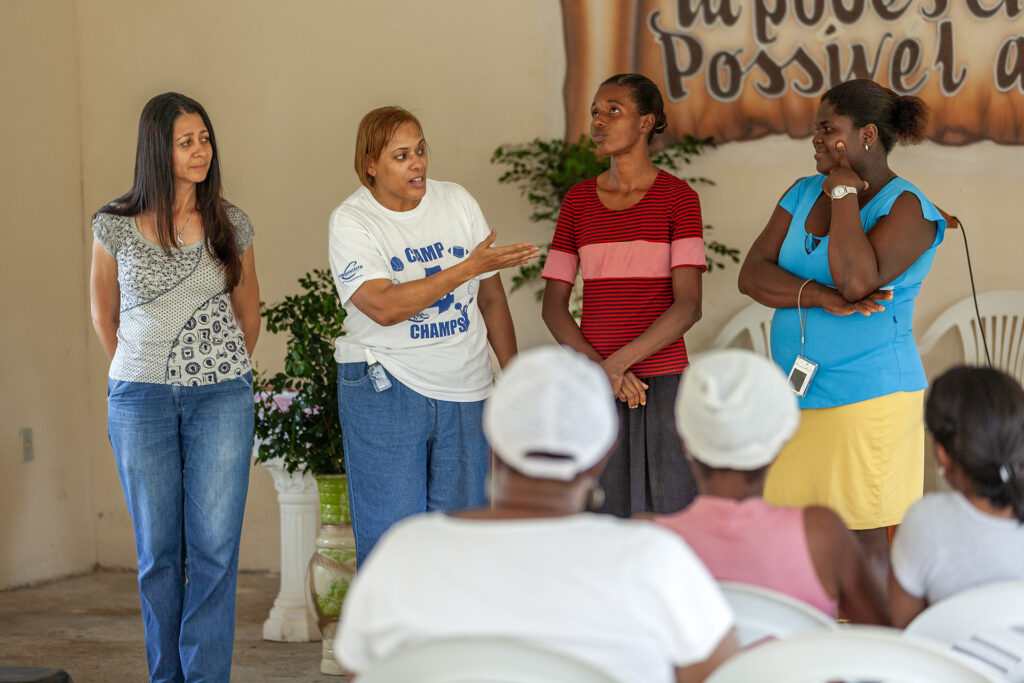Keith Jefferson stood at an all-too-familiar pulpit in Cachoeira, Bahia in Brazil. With gratitude, he looked out at the church he’d partnered closely with during his time on the field over a decade ago. The retired International Mission Board missionary finished his sermon, and a young Quilombola walked the aisle, tears in his eyes.
Broken over his sin, he came forward and buried his head in the preacher’s chest. “I surrender. I just give up. I want Jesus in my life,” he said. That night, he was one of three to decide to follow Christ.
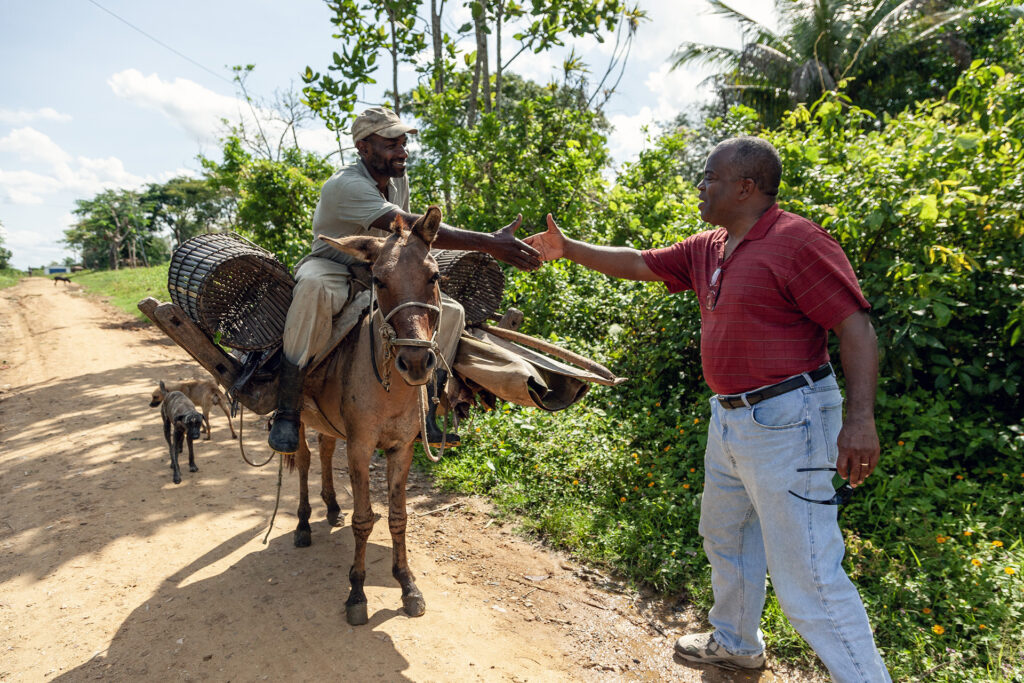
Keith Jefferson, former IMB African American strategy connector and retired missionary to Brazil, greets a Quilombola man. Jefferson is the first African American IMB missionary to Brazil, and even in retirement, he’s still active on mission trips, connecting churches in the U.S. to the ongoing work in Brazil. IMB Photo
Anytime someone puts their faith in Christ, Jefferson knows it’s an act of God. But when a Quilombola comes to faith, it’s extra special to Jefferson. The entire trip proved to be notable. Later that week, the Jeffersons were honored at another church through song and speeches. This church was one Keith helped build with his hands 15 plus years ago. He’d returned with a team of volunteers from a church in the United States. He wanted them to see this – the fruit of missions – a thriving church among a previously unengaged people group. He wanted them, and wants all Southern Baptist churches, to catch this vision.
He and his wife, Deborah, marveled at all God had done in the church since they left the field in 2011. As a plant of the church he preached in earlier that week, he was thankful the Quilombola church was being constantly mentored and encouraged by the local Brazilian congregation about 30 minutes away.
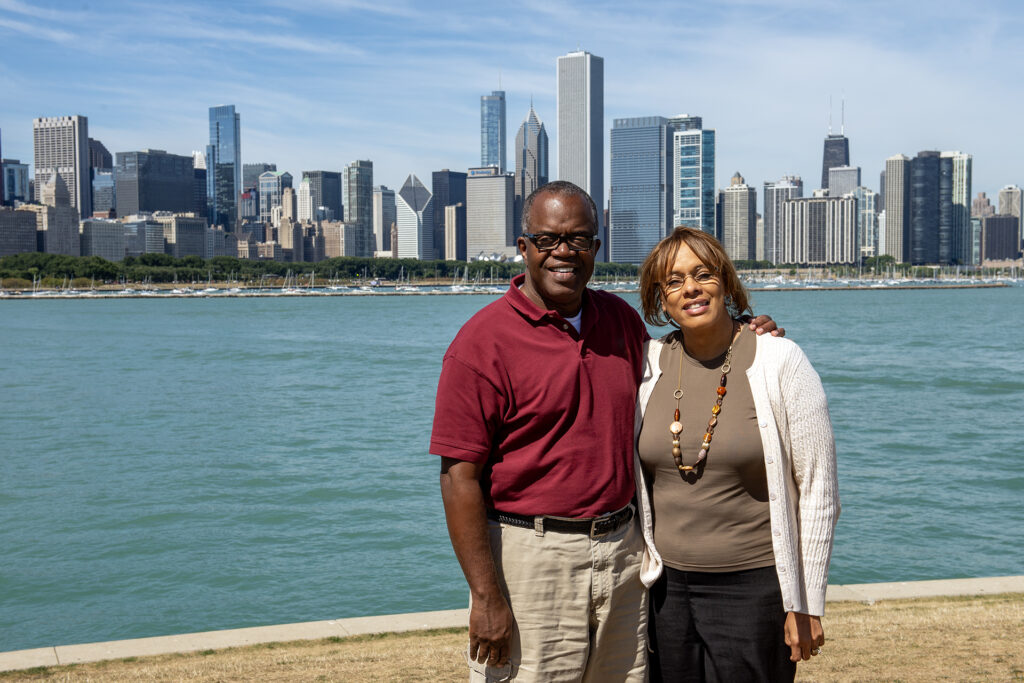
Keith and Deborah Jefferson pose for a quick portrait in front of the Chicago skyline. The Jeffersons, the IMB’s first African American missionaries to Brazil, were invited to the Global Impact Celebration at Broadview Missionary Baptist Church in 2013. IMB Photo
Jefferson returned to a different world than the one he arrived in the late 90s.
While living as a missionary in Brazil, he learned of the Quilombola tribes. They’re an unreached people group. Before 1997, they were largely unengaged. There was one known believer in the entire Quilombo village where Jefferson first visited. They trace their ancestry back to escaped or freed slaves during the time of the slave trade and after in Brazil.
Jefferson first heard of the people through an Afro-Brazilian pastor he worked with during his over 15 years on the field. At that time, he and Deborah traveled 200 miles from the city where they lived, trekked an hour down a dirt path with the national pastor and found the front door of the small hut where the only known Christian in the village lived.
“How long has it been since a minister has visited this village?” Jefferson asked the believing Quilombola woman.
She replied, teary eyed, “Pastor Jefferson, we have not had a minister in over four and a half years.”
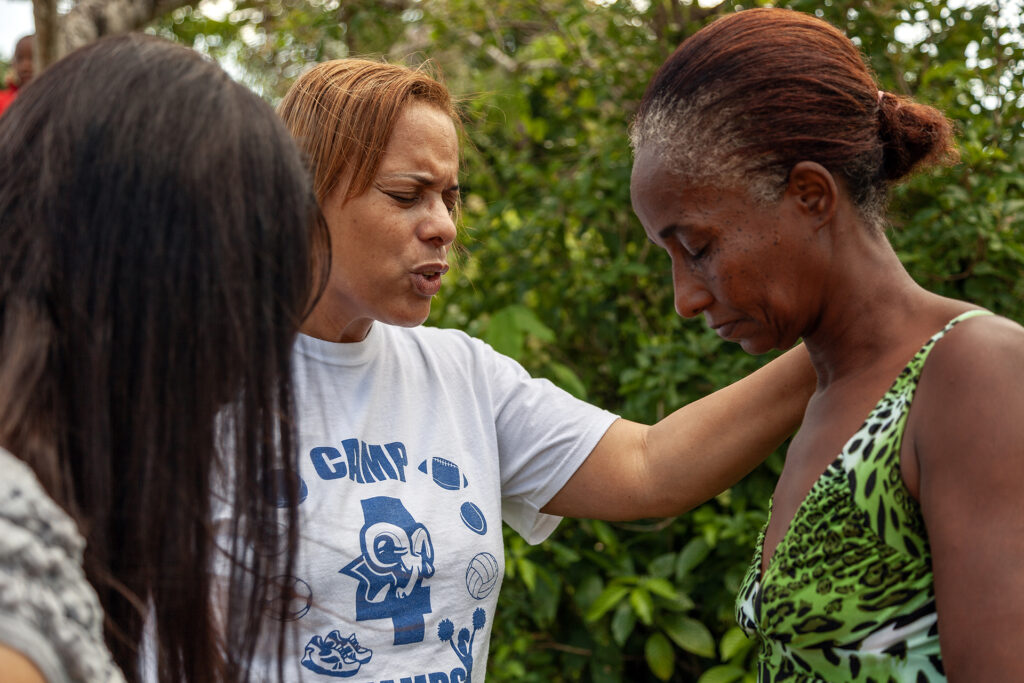
Eneida Lima (left), a Brazilian who helped a volunteer team from Buffalo, New York, as an interpreter, and Deborah Jefferson, retired missionary to Brazil, pray with a Quilombola woman. IMB Photo
Decades later, while recounting the story, the emotion is apparent in his voice. “As an American Christian this was beyond my understanding,” he said, his voice choking back tears. “I thought to myself ‘So you mean there has been no one to preach, to marry, bury or baptize any individuals?’”
After this initial contact, “I felt God leading me to help take the gospel to as many Quilombola villages as possible,” he explained.
For the next 10 years, he mapped out and visited villages and surveyed over 130 Quilombolas. He’d navigate muddy roads, entering regions much different than the Brazilian cities. Single bedroom homes were crafted from mud. Women still carried water from ponds to care for their families and after sunset, everything went dark. With the help of the Brazilian officials and national pastors, he and his team were able to strategically locate clusters of villages, plant churches, host Vacation Bible Schools and share the gospel with those who hadn’t heard the good news.
Each time Jefferson returns to one of his villages, he’s amazed that water and electricity run through modernized homes – often made of brick now.
When Jefferson left his position as an IMB missionary, he wanted to be a part of sending so that more missionaries would take his place, perhaps working among the Quilombolas. He served for five years as the African American missional strategist in the IMB’s Richmond office, where he focused on mobilizing Black churches to the nations.
- Keith Jefferson (right), a retired IMB missionary among the Quilombola people of Brazil, returned for a visit along with volunteers from North Buffalo Baptist Church in Buffalo, New York. Jefferson often leads churches in the U.S. on short-term mission trips to the people he poured into as a missionary. IMB Photo
- Two Quilombola women (right) tell their personal stories as Brazilian interpreter Eneida Lima (left) and Deborah Jefferson, retired missionary to Brazil, translate in to Portuguese. Listening are volunteers from North Buffalo Baptist Church, Buffalo, New York. IMB Photo
He’s retired now, but he hasn’t slowed down in his love for Brazilians or his passion to see Black churches on the move. Since retirement in 2016, he’s been on nearly 10 mission trips. At least once or twice a year, he visits his beloved Brazil – like the last trip he took. But he doesn’t go alone because he’s a mobilizer at heart.
When he takes these trips, he brings along leadership from churches he connected with during his time as a missional strategist. There, he introduces the pastors and church leaders to national pastors. In turn, they can form their own relationships – sometimes lasting.
On his last trip, Ken Tilley, pastor of Crosslink Baptist Church in Mebane, North Carolina, brought with him several church members after experiencing a vision trip with the Jeffersons earlier in 2023. On these trips, they did ministry in the cities, sharing the light of Jesus in a drug-saturated culture, while also visiting Quilombos.
They went into schools and spoke on abstinence, suicide prevention and the dangers of drug abuse. They also hosted sports camps for youth. Because of the culture of respect for elders, both Deborah and Keith agreed that the messages the team shared with the Brazilian teenagers were well-received. In November 2024, Jefferson is planning to accompany another group on a trip, hoping they catch the vision too.
Jefferson believes that retired missionaries are valuable to the ongoing mobilization of churches because they not only have experience, but they also have contacts – if they’ll keep up with them.
“We’re at our peak number of contacts and places we’ve been and pastors we’ve worked with. So, keep up with them,” he encouraged retired missionaries. “It’s important. Don’t let your contacts go. Call up your old friends and pastors and let them know you’re praying for them.”
Do you feel God calling you to go to the nations like He did the Jeffersons? Visit IMB.org/go to take the first steps.


